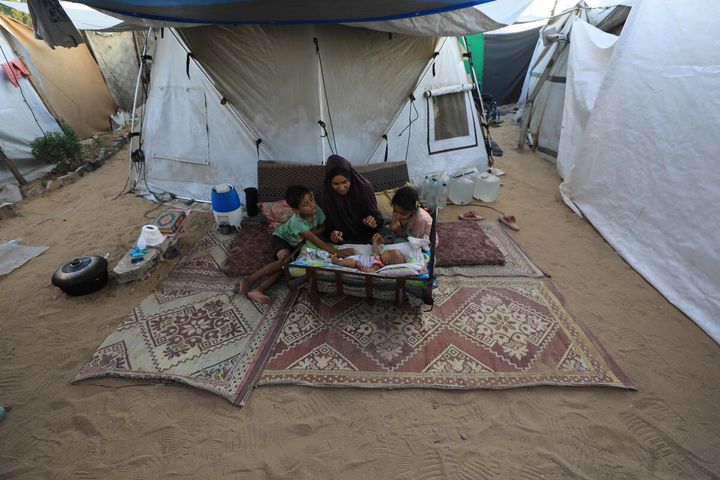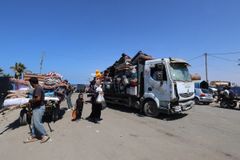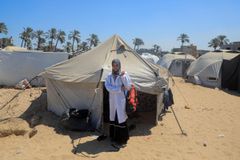
“I had no choice but to deliver my own baby”: Health workers in Gaza city describe impossible conditions
GAZA STRIP, Occupied Palestinian Territory – “The labour pains hit me at 4 am, but there was no one to help,” said Yasmeen, a midwife in Gaza city. “I felt it might end with my death, and the death of my unborn baby.”
Her husband rushed out to seek help, but no ambulance was available and no one else could get them to a hospital. Yasmeen braced herself for delivery. “I asked my children to put a mattress on the floor. I had no painkillers. But I had no choice but to deliver my own baby.”

Yasmeen used to work in the maternity and neonatal department of Al-Shifa Hospital, but after the facility suffered extensive damage from continued Israeli attacks it is no longer able to provide maternal health services. These have been transferred to Al-Helou Maternity Hospital, where UNFPA is providing reproductive health kits, medicine and postpartum supplies.
“My little children were crying in terror as I was suffering in front of them,” said Yasmeen. “I didn’t know what would happen to me in the next few minutes.”
Only 15 health facilities in Gaza are currently able to provide obstetric and newborn care, four of which are in Gaza city, and all are overwhelmed with patients and shortages of beds and critical supplies. Medicine, sanitary items, surgical equipment and health workers are all running out as few places have been spared the onslaught.
Every week in Gaza at least 15 women deliver babies outside a health facility, without a skilled birth attendant, risking the lives of both mother and newborn – as was now the case for Yasmeen. She recalled, “I grabbed his head and body and felt all the sounds stop; I could only hear my baby's voice and my own.”
After delivering him safely, she quickly cut her baby’s umbilical cord, dressed him, and started breastfeeding.
An unprecedented crisis
Yasmeen said she has seen multiple cases of pregnant women suffering devastating injuries. One woman had a leg and a hand amputated, and soon after lost her pregnancy from the blood loss.
“I had nothing to say to that mother to support her psychologically, after everything she had lost,” she said. “But I gathered my strength and dealt with the situation as her primary supporter.”
UNFPA estimates that there are 55,000 pregnant women currently trapped in a cycle of displacement, bombardment, severe hunger and malnutrition, with nowhere to seek medical help. Approximately 130 babies are born every day across Gaza, more than a quarter of whom are delivered by Caesarean section. Around one in five newborns are born prematurely or suffer from low birth weight and other complications.
At the Nasser Medical Complex in Gaza city, Dr. Ahmed, director of the Paediatric and Maternal Health Department, said, “The situation is catastrophic. Our paediatric emergency ward now receives more than 1,000 children every day, which is ten times the normal caseload. At the same time, 200 newborns are currently admitted to intensive care, despite us only having capacity for 40.”
He said up to three babies often share a single incubator. “In the past 24 hours alone, 13 children have died here, including 10 stillbirths and 3 premature babies who died in incubators.”
“We are also running critically low on IV fluids, antibiotics, disinfectants, sterilizers and other essential medical supplies.”
Premature births, miscarriages and stillbirths are rising among pregnant women and new mothers in Gaza, as they are weakened by extreme hunger – in many cases famine – severe malnutrition, exhaustion and the constant fear caused by displacement and bombardment.
“Their deteriorating health left them unable to carry their pregnancies to term,” explained the doctor.
Mothers and babies killed in childbirth
Midwife Sahar described how a friend went into labour at seven months pregnant while trapped in Gaza city’s besieged Zeitoun neighbourhood. “I didn't have any tools to use during the delivery. I didn't even have gloves,” she told UNFPA.
“I used a knife, heated over a fire, to cut the baby's umbilical cord, and scented tissues as bandages.”
UNFPA currently has more than over 125 trained and equipped midwives deployed to health facilities and among communities to support reproductive health and assist with emergency deliveries. But since January 2025, the World Health Organisation has recorded over 175 attacks on healthcare facilities in the Gaza Strip, and more than 100 health workers have been killed in 2025 alone.
Sahar herself narrowly avoided being targeted by drones when trying to assist another woman in labour. “I couldn’t get close because they were shooting at anyone who moved. I stood at a distance, shouting instructions, asking bystanders to tell the mother to breathe,” she said.
The newborn didn’t get the same chance. “When I finally arrived, the baby’s head had come out, his skin was blue. I tried to resuscitate him, but he needed an incubator, which was impossible to find.”
Delivering amid adversity
Sahar described one of her most challenging deliveries as one she assisted without access to enough supplies. “The patient suffered severe postpartum haemorrhage. There was no blood available, no way to transfer her, and no doctor could come. We couldn’t stop the bleeding and she died, leaving behind her newborn.”
UNFPA remains on the ground in Gaza city and plans to expand services in the south to meet the growing demand from forced evacuations. Together with partners, UNFPA has opened a field maternity hospital in Nusierat near the town of Deir al-Balah and a health centre at Al Rashid reception area.
Limited supplies have recently been granted entry and are being distributed, but the needs are staggering. And if the remaining health facilities in Gaza city are forced to shut down, the health system will lose more than half of its total bed capacity for maternal and newborn care.
Keywords
Contacts
Emmi Kallio-SponholtzUNFPA Nordic Representation Office
Tel:+45 26 77 66 58kallio@unfpa.orgImages


About UNFPA:
UNFPA is the United Nations sexual and reproductive health agency. UNFPA’s mission is to deliver a world where every pregnancy is wanted, every childbirth is safe and every young person’s potential is fulfilled. UNFPA calls for the realization of reproductive rights for all and supports access to a wide range of sexual and reproductive health services, including voluntary family planning, quality maternal health care and comprehensive sexuality education.
Subscribe to releases from UNFPA
Subscribe to all the latest releases from UNFPA by registering your e-mail address below. You can unsubscribe at any time.
Latest releases from UNFPA
Internationella klimakteriedagen: Dags för jämställdhet och rättvisa för kvinnors hälsa17.10.2025 13:23:09 CEST | Nyhed
Menopaus påverkar hälften av världens befolkning, och andelen av kvinnor som genomgått menopaus växer. År 2050 förväntas kvinnor över 50 år utgöra cirka 35 procent av den globala befolkningen tack vare förbättrad hälsa, livsstil och ökad livslängd världen över. Ändå är menopaus ett av de mest förbisedda områdena inom kvinnors hälsa på grund av tabun, stigma och missuppfattningar. Den internationella klimakteriedagen markeras den 18 oktober.
Afgørende at investere i kvinders og pigers rettigheder og valgmuligheder, herunder adgang til prævention26.9.2025 08:35:31 CEST | Pressemeddelelse
Reproduktiv handlefrihed - altså muligheden for selv at bestemme om og hvornår man vil have børn - er en grundlæggende menneskerettighed. Men for millioner af mennesker er denne rettighed stadig ikke opfyldt. Over hele verden oplever mennesker ikke planlagte graviditeter eller er ude af stand til at få de børn, de ønsker, hvilket har betydelig indvirkning på deres fysiske og mentale helbred.
En kvinde med et mål: Seksualundervisning til unge i Mexico City12.9.2025 08:34:31 CEST | Nyhed
MEXICO CITY, Mexico – “Mit mål er, at flest mulige unge mennesker i Mexico City får god seksualundervisning,” siger Rocío Ordóñez Pedraza. Den 32-årige psykolog og meningsdanner arbejder for Mexico Vivo Foundation. Pedraza er fast besluttet på at bryde tabuer og stigmatisering omkring seksualundervisning, især i mere konservative lokalsamfund, hvor der sjældent tales om disse emner.
Hungersnød bekræftet i Gaza – gravide kvinder og nyfødte i akut fare29.8.2025 11:36:54 CEST | Nyhed
GAZA-STRIBEN, De Besatte Palæstinensiske Områder – ”Hvor er verden, når den ser, hvad der sker med os og vores børn? Alle familier i verden har børn,” siger Inas, der bor i en flygtningelejr med sine tre børn i Gaza-byen – hvor det nu for første gang er bekræftet, at der er hungersnød. ”Ville de acceptere, at deres børn vågnede sultne op?”
International humanitarian law flouted as health and aid workers are targeted in conflicts around the world19.8.2025 09:34:16 CEST | News
UNITED NATIONS, New York – Across the world, wars are being waged on the very systems set up to protect civilian populations: Health workers, hospitals, health centres and ambulances are being targeted in horrifying numbers.